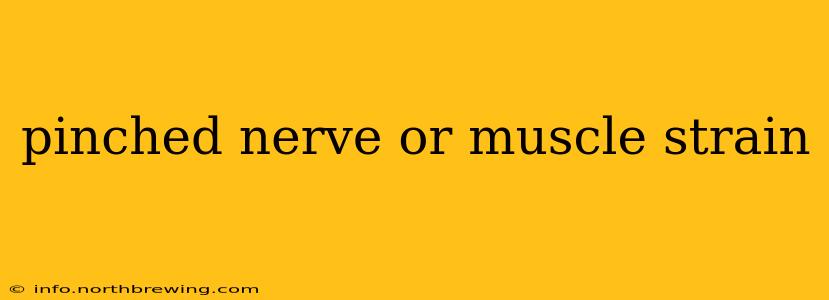Experiencing pain in your neck, back, or limbs can be debilitating. Two common causes are pinched nerves and muscle strains. While both can cause similar symptoms, understanding the differences is crucial for proper diagnosis and treatment. This article will delve into the key distinctions between a pinched nerve and muscle strain, helping you better understand your condition and seek appropriate medical attention.
What is a Pinched Nerve?
A pinched nerve, also known as a compressed nerve, occurs when surrounding tissues, such as bones, cartilage, tendons, or muscles, put pressure on a nerve. This pressure can disrupt the nerve's ability to transmit signals, leading to pain, numbness, tingling, weakness, or even paralysis depending on the severity and location of the nerve compression. Common locations for pinched nerves include the neck (cervical radiculopathy), lower back (lumbar radiculopathy), and wrist (carpal tunnel syndrome).
What Causes a Pinched Nerve?
Several factors can contribute to a pinched nerve:
- Poor posture: Prolonged sitting or standing in awkward positions can put undue stress on the spine, leading to nerve compression.
- Spinal stenosis: Narrowing of the spinal canal puts pressure on the spinal cord and nerves.
- Herniated disc: A bulging or ruptured disc can press against nearby nerves.
- Repetitive movements: Repeatedly performing the same actions can strain muscles and cause nerve compression.
- Trauma: Injuries like falls or car accidents can also result in pinched nerves.
- Osteoarthritis: Degenerative joint disease can lead to bone spurs that compress nerves.
What is a Muscle Strain?
A muscle strain, also known as a pulled muscle, is an injury to a muscle or tendon (the tissue connecting muscle to bone). Strains occur when muscles are overstretched or torn, resulting in pain, inflammation, and muscle weakness. Muscle strains are often graded based on severity: Grade 1 (mild), Grade 2 (moderate), and Grade 3 (severe tear). They commonly affect muscles in the back, legs, and hamstrings.
What Causes a Muscle Strain?
Muscle strains typically result from:
- Overexertion: Pushing muscles beyond their limits during exercise or physical activity.
- Sudden movements: Jerky or forceful movements can easily strain muscles.
- Poor physical condition: Weak or inflexible muscles are more prone to strains.
- Improper warm-up: Failing to adequately prepare muscles before exercise increases the risk of injury.
- Muscle imbalances: Disproportionate strength between muscle groups can lead to strain in weaker areas.
Pinched Nerve vs. Muscle Strain: Key Differences
While symptoms can overlap, there are key distinctions:
| Feature | Pinched Nerve | Muscle Strain |
|---|---|---|
| Primary Cause | Nerve compression | Muscle or tendon overstretching or tearing |
| Pain Type | Sharp, shooting, radiating, numbness, tingling | Dull, aching, localized |
| Weakness | Often present, can be significant | May be present, but usually less severe |
| Range of Motion | Limited range of motion may be present | Limited range of motion often present |
| Symptoms | Numbness, tingling, weakness, radiating pain | Pain, inflammation, muscle spasm, tenderness |
How are Pinched Nerves and Muscle Strains Diagnosed?
Diagnosis typically involves a physical examination by a doctor or physical therapist. They will assess your symptoms, medical history, and conduct neurological tests to check reflexes, muscle strength, and sensation. Imaging tests, such as X-rays, MRIs, or CT scans, may be needed to rule out other conditions and confirm the diagnosis, particularly in cases of pinched nerves.
Treatment Options for Pinched Nerves and Muscle Strains
Treatment for both conditions often involves a combination of conservative approaches:
- Rest: Avoiding activities that aggravate the pain.
- Ice: Applying ice packs to reduce inflammation (especially in the early stages of a muscle strain).
- Heat: Applying heat packs after the initial inflammation subsides (more effective for muscle strains).
- Over-the-counter pain relievers: Medications like ibuprofen or acetaminophen can help manage pain and inflammation.
- Physical therapy: Exercises and stretches to improve flexibility, strength, and range of motion.
- Medications: In some cases, stronger pain relievers or muscle relaxants may be prescribed.
- Injections: Corticosteroid injections can help reduce inflammation around a pinched nerve.
- Surgery: In severe cases of pinched nerves, surgery may be necessary to relieve pressure on the nerve.
Can a Pinched Nerve Cause a Muscle Strain?
While not directly causing a muscle strain, a pinched nerve can indirectly contribute. The pain and altered nerve signals from a pinched nerve can lead to muscle spasms and guarding, potentially increasing the risk of a muscle strain. If you are experiencing pain associated with a possible nerve issue, it is important to get a professional evaluation.
What are the long-term effects of untreated pinched nerves and muscle strains?
Untreated pinched nerves can lead to chronic pain, permanent nerve damage, muscle atrophy (muscle wasting), and functional limitations. Similarly, untreated muscle strains can result in chronic pain, muscle weakness, and recurrent injuries. Early intervention and appropriate treatment are crucial to minimize long-term complications.
This information is for general knowledge and does not constitute medical advice. Always consult a healthcare professional for diagnosis and treatment of any medical condition.
